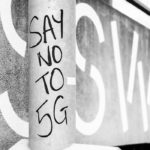 Conspiracy theories seem to have been on the rise since the emergence of social media has given them such a perfect environment to be created and propagated. New research from the Queensland University of Technology suggests that Covid-19 has made this environment even more fertile.
Conspiracy theories seem to have been on the rise since the emergence of social media has given them such a perfect environment to be created and propagated. New research from the Queensland University of Technology suggests that Covid-19 has made this environment even more fertile.
The researchers examined the origins of rumors on Facebook that the coronavirus was caused by 5G technology to find a conspiracy that began life preaching to the already converted, before rapidly spreading further afield as it was shared widely.
“Pre-existing conspiracy groups have jumped on the COVID-19 bandwagon and retrofitted their conspiracy theories to the pandemic, to argue the coronavirus outbreak justifies and proves their claims,” the researchers say. “If you are against the roll-out of 5G, for example, then you link it with COVID-19. Other COVID-19 related conspiracy theories include claims it was developed in laboratory in Wuhan, or that it is a ruse by a secret ‘world government’ to suppress civil liberties.”
Down the rabbit hole
The researchers say that they focused on the 5G conspiracy because they believe it’s generated the most visible and immediate impacts, as mobile phone towers had been attacked around the world during April.
“Much of the early circulation of COVID/5G mis- and disinformation remained niche and reached only existing conspiracy communities. It also existed early on in a wide range of languages, but English-language content contributed most prominently to its spread,” they say.
“We found lockdowns and other government restrictions seemed to lead to a growth in COVID/5G misinformation; this may be due to people assuming some kind of hidden agenda behind them, but also simply a sign of people having more time on their hands to search social media for coronavirus-related content.”
Amplifying the message
The situation worsened when various celebrities, including Woody Harrelson and singer Keri Hilson, started to play a role in spreading the conspiracy. This helped it to break out of established conspiracist communities into the mainstream.
“Musicians, actors, sportspeople, and fringe politicians, but (especially in Africa) also evangelist preachers, have all been guilty of this,” the researchers explain. “Coverage of their statements in entertainment and mainstream media further amplified such misinformation, even if the media coverage was critical.”
This then typically prompted a response from fact checking services, as well as governments and health agencies, who while obviously debunking the conspiracy theories also gave them the oxygen of publicity.
“It’s win-win for the conspiracy theorists – when their claims are widely reported, even critically, they can then present any denials of their claims as evidence that the government is trying to suppress ‘the truth’,” the researchers say. “This makes the true believers even more committed.”
That’s not to say that debunking these myths is not still important, as the key is to stop citizens from believing misinformation. The hardcore believers will always believe that such debunking is a part of the conspiracy itself, so are in a sense impossible to help, but if you discourage waverers from believing such nonsense then it plays a valuable role.